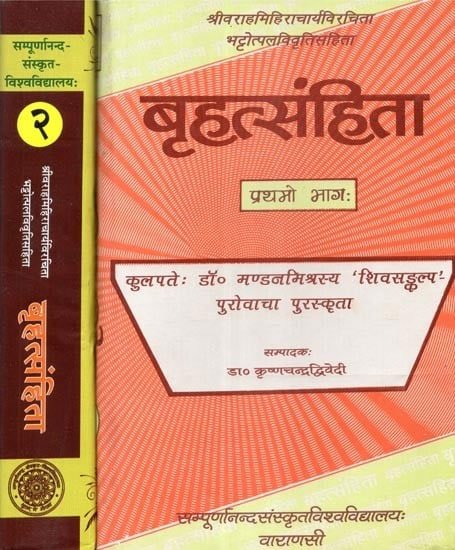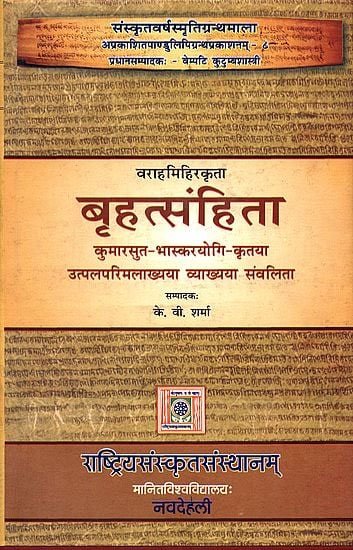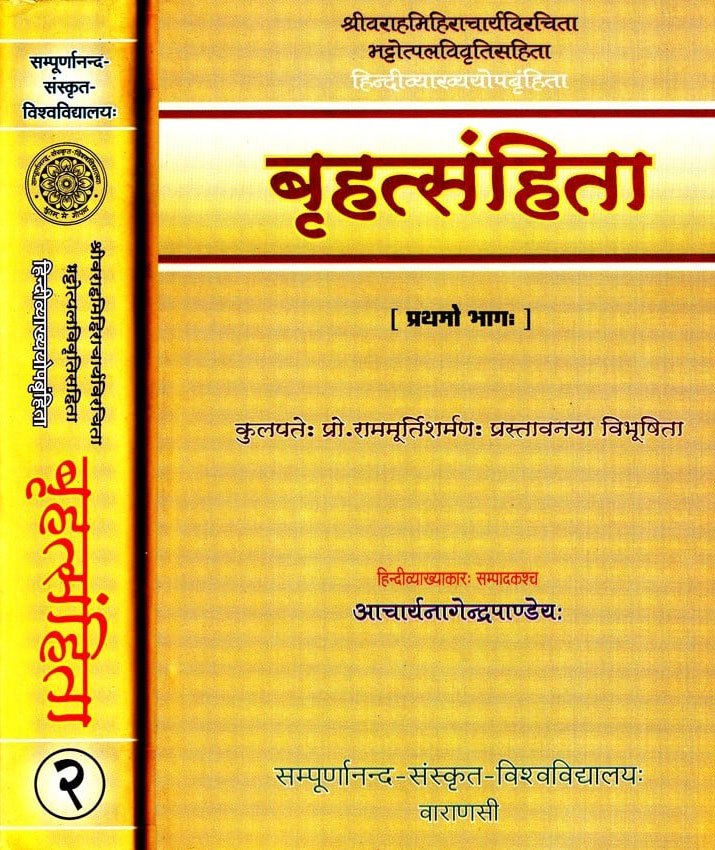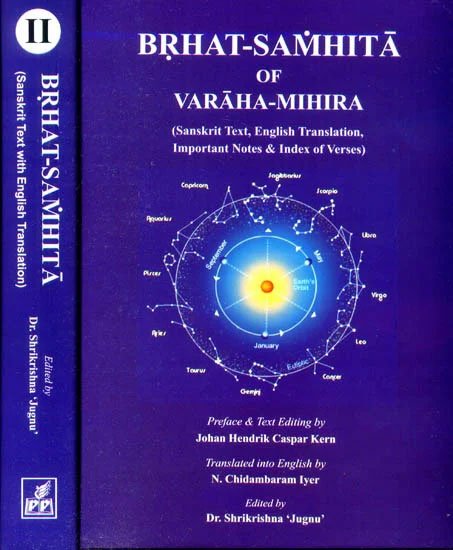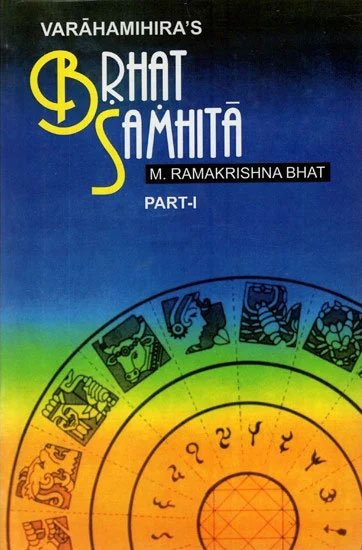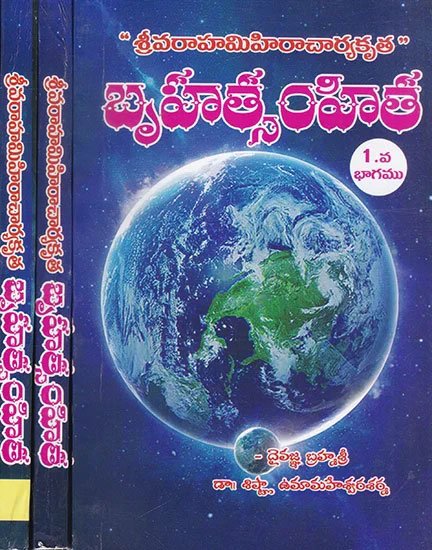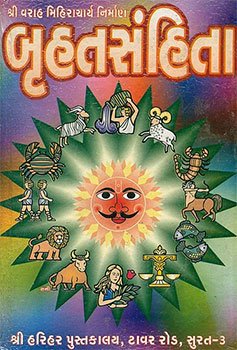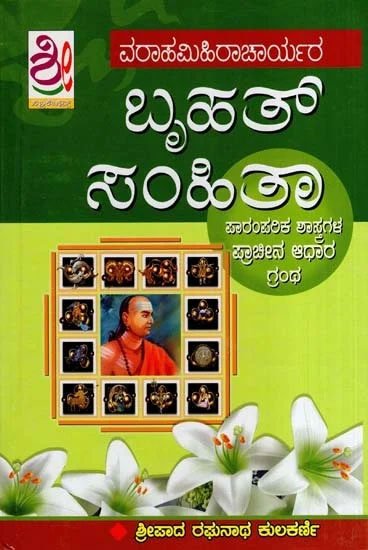Brihat-samhita [sanskrit]
26,560 words
The Sanskrit text of the Brihat-samhita from the 6th-century authored by Varaha Mihira in present-day Ujjain, India. It primarily deals with astrology and astronomy but is presented as an encyclopedia of knowledge.
Verse 65.2
अश्रुपातहनुगण्डहृद्गलप्रोथशङ्खकटिबस्तिजानुनि ।
मुष्कनाभिककुदे तथा गुदे सव्यकुक्षिचरणे तथा शुभाः ॥ २ ॥
[हृड् । चरणेषु च । अशुभाः]
aśrupātahanugaṇḍahṛdgalaprothaśaṅkhakaṭibastijānuni |
muṣkanābhikakude tathā gude savyakukṣicaraṇe tathā śubhāḥ || 2 ||
[hṛḍ | caraṇeṣu ca | aśubhāḥ]
The Sanskrit text of Verse 65.2 is contained in the book Brihata Samhita (Sanskrit Text with Hindi Translation) by Pandit Achyutananda Jha. This book is available online or you could buy the latest edition:
Read online Buy now! The Sanskrit text by Pandit Achyutananda Jha (2001)
Glossary of Sanskrit terms
Note: This extracts Sanskrit terms and links to English definitions from the glossary, based on an experimental segmentation of verse (65.2). Some terms could be superfluous while some might not be mentioned. Click on the word to show English definitions.
Ashrupata, Hanu, Ganda, Hridga, Protha, Shankha, Kati, Katin, Basti, Janu, Mushka, Nabhika, Tatha, Guda, Savya, Kukshi, Carana, Carani, Shubha,
Analysis of Sanskrit grammar
Note: this is an experimental feature and only shows the first possible analysis of the Sanskrit text (Verse 65.2). If the system was successful in segmenting the sentence, you will see of which words it is made up of, generally consisting of Nouns, Pronouns, Verbs, Participles and Indeclinables. Click on the link to show all possible derivations of the word.
- Line 1: “aśrupātahanugaṇḍahṛdgalaprothaśaṅkhakaṭibastijānuni ”
- aśrupāta -
-
aśrupāta (noun, masculine)[compound], [vocative single]
- hanu -
-
hanu (noun, feminine)[compound], [adverb]hanu (noun, masculine)[compound], [adverb]hanu (noun, neuter)[compound], [adverb], [nominative single], [vocative single], [accusative single]hanū (noun, masculine)[adverb], [vocative single]hanū (noun, feminine)[compound], [adverb], [vocative single]hanū (noun, neuter)[compound], [adverb], [nominative single], [vocative single], [accusative single]
- gaṇḍa -
-
gaṇḍa (noun, masculine)[compound], [vocative single]gaṇḍa (noun, neuter)[compound], [vocative single]√gaṇḍ (verb class 1)[imperative active second single]
- hṛdga -
-
hṛdga (noun, masculine)[compound], [vocative single]hṛdga (noun, neuter)[compound], [vocative single]
- la -
-
la (noun, masculine)[compound], [vocative single]
- protha -
-
protha (noun, masculine)[compound], [vocative single]protha (noun, neuter)[compound], [vocative single]√proth (verb class 1)[imperative active second single]√pruth (verb class 1)[imperative active second single]
- śaṅkha -
-
śaṅkha (noun, masculine)[compound], [vocative single]śaṅkha (noun, neuter)[compound], [vocative single]
- kaṭi -
-
kaṭi (noun, feminine)[compound], [adverb]kaṭī (noun, feminine)[adverb], [vocative single]kaṭin (noun, masculine)[compound], [adverb]kaṭin (noun, neuter)[compound], [adverb], [nominative single], [vocative single], [accusative single]
- basti -
-
basti (noun, masculine)[compound], [adverb]basti (noun, feminine)[compound], [adverb]basti (noun, neuter)[compound], [adverb], [nominative single], [vocative single], [accusative single]
- jānuni -
-
jānu (noun, neuter)[locative single]
- Line 2: “muṣkanābhikakude tathā gude savyakukṣicaraṇe tathā śubhāḥ || 2 |”
- muṣka -
-
muṣka (noun, masculine)[compound], [vocative single]
- nābhika -
-
nābhika (noun, masculine)[compound], [vocative single]nābhika (noun, neuter)[compound], [vocative single]
- ku -
-
ku (indeclinable particle)[indeclinable particle]ku (noun, feminine)[compound], [adverb]kū (noun, feminine)[adverb], [vocative single]
- de -
-
da (noun, masculine)[locative single]da (noun, neuter)[nominative dual], [vocative dual], [accusative dual], [locative single]dā (noun, feminine)[nominative dual], [vocative single], [vocative dual], [accusative dual]dā (noun, masculine)[dative single]
- tathā* -
-
tathā (noun, feminine)[nominative plural], [vocative plural], [accusative plural]tatha (noun, masculine)[nominative plural], [vocative plural]
- gude -
-
guda (noun, masculine)[locative single]gudā (noun, feminine)[nominative dual], [vocative single], [vocative dual], [accusative dual]
- savya -
-
savya (noun, masculine)[compound], [vocative single]savya (noun, neuter)[compound], [vocative single]√su -> savya (participle, masculine)[vocative single from √su class 5 verb]√su -> savya (participle, neuter)[vocative single from √su class 5 verb]√su -> savya (participle, masculine)[vocative single from √su class 1 verb], [vocative single from √su class 2 verb]√su -> savya (participle, neuter)[vocative single from √su class 1 verb], [vocative single from √su class 2 verb]√sū -> savya (participle, masculine)[vocative single from √sū class 6 verb]√sū -> savya (participle, neuter)[vocative single from √sū class 6 verb]√sū -> savya (participle, masculine)[vocative single from √sū class 2 verb]√sū -> savya (participle, neuter)[vocative single from √sū class 2 verb]
- kukṣi -
-
kukṣi (noun, feminine)[compound], [adverb]kukṣi (noun, masculine)[compound], [adverb]kukṣī (noun, feminine)[adverb], [vocative single]
- caraṇe -
-
caraṇa (noun, masculine)[locative single]caraṇa (noun, neuter)[nominative dual], [vocative dual], [accusative dual], [locative single]caraṇi (noun, masculine)[vocative single]caraṇi (noun, feminine)[vocative single]
- tathā -
-
tathā (indeclinable correlative)[indeclinable correlative]tathā (indeclinable)[indeclinable]tathā (noun, feminine)[nominative single]
- śubhāḥ -
-
śubha (noun, masculine)[nominative plural], [vocative plural]śubhā (noun, feminine)[nominative plural], [vocative plural], [accusative plural]
- Cannot analyse 2
- Line 3: “[hṛḍ | caraṇeṣu ca ”
- Cannot analyse hṛḍ*ca
- caraṇeṣu -
-
caraṇa (noun, masculine)[locative plural]caraṇa (noun, neuter)[locative plural]
- ca -
-
ca (indeclinable conjunction)[indeclinable conjunction]ca (noun, masculine)[compound], [vocative single]ca (noun, neuter)[compound], [vocative single]
Other editions:
Also see the following editions of the Sanskrit text or (alternative) English translations of the Verse 65.2
Brhatsamhita with the Commentary of Bhattotpala
by Krishna Chandra Dwivedi (2016)
Publisher: Sampurnanand Sanskrit University; 1229 pages;
Buy now!
Brihat Samhita with the Commentary of Utpalapatimala of Yogisvara
by K. V. Sharma (2012)
Publisher: Rashtriya Sanskrit Sansthan, Janakpuri; 754 pages; ISBN-10; 8186111360; ISBN-13: 9788186111369
Buy now!
Brihat Samhita (Hindi Translation)
by K. V. Sharma (2002)
Publisher: Sampurnanand Sanskrit University; 2359 pages; ISBN-13: 9789387890008.
Buy now!
Brhat Samhita (English translation)
by N. Chidambaram Iyer (2022)
Publisher: Parimal Publication Pvt. Ltd.; 801 pages; Edited by Dr. Shrikrishna Jugnu; ISBN-10: 8171104215; ISBN-13: 9788171104215.
Buy now!
Brhat Samhita (English with notes)
by M. Ramakrishna Bhat (2010)
Publisher: Motilal Banarsidas Publishers Pvt. Ltd.; 1155 pages; ISBN-10: 8120810600; ISBN-13: 9788120810600.
Buy now!
Brhat Samhita (Telugu translation)
by Sishtla Umamaheswara Sharma (2020)
Publisher: Mohan Publications, Andhra Pradesh; 846 pages.
Buy now!Preview of verse 65.2 in Kannada sript:
ಅಶ್ರುಪಾತಹನುಗಣ್ಡಹೃದ್ಗಲಪ್ರೋಥಶಙ್ಖಕಟಿಬಸ್ತಿಜಾನುನಿ ।
ಮುಷ್ಕನಾಭಿಕಕುದೇ ತಥಾ ಗುದೇ ಸವ್ಯಕುಕ್ಷಿಚರಣೇ ತಥಾ ಶುಭಾಃ ॥ ೨ ॥
[ಹೃಡ್ । ಚರಣೇಷು ಚ । ಅಶುಭಾಃ]
Brhat Samhita (Gujarati translation)
by - (2000)
Publisher: Shree Harihar Pustakalay, Surat; Author: Shri Varahamihira Acharya (શ્રી વરાહમિહીરાચાર્ય); 432 pages.
Buy now!Preview of verse 65.2 in Gujarati sript:
અશ્રુપાતહનુગણ્ડહૃદ્ગલપ્રોથશઙ્ખકટિબસ્તિજાનુનિ ।
મુષ્કનાભિકકુદે તથા ગુદે સવ્યકુક્ષિચરણે તથા શુભાઃ ॥ ૨ ॥
[હૃડ્ । ચરણેષુ ચ । અશુભાઃ]
Brhat Samhita (Kannada translation)
by Sripada Raghunatha Kulkarni (2021)
Publisher: Srinidhi Publications, Bangalore; 668 pages with illustrations.
Buy now!Preview of verse 65.2 in Kannada sript:
ಅಶ್ರುಪಾತಹನುಗಣ್ಡಹೃದ್ಗಲಪ್ರೋಥಶಙ್ಖಕಟಿಬಸ್ತಿಜಾನುನಿ ।
ಮುಷ್ಕನಾಭಿಕಕುದೇ ತಥಾ ಗುದೇ ಸವ್ಯಕುಕ್ಷಿಚರಣೇ ತಥಾ ಶುಭಾಃ ॥ ೨ ॥
[ಹೃಡ್ । ಚರಣೇಷು ಚ । ಅಶುಭಾಃ]
![Brihat-samhita [sanskrit] - book cover](/uploads/a/Brihat-Samhita-Sanskrit.jpg)
